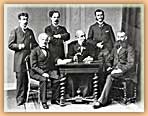 |

Greece's diplomatic position during the 19th century was certainly not enviable. The dependence of the country's foreign policy on the Great Powers was neither simply a result of the imbalance of power between world-dominating states and small newly established states, nor, of course, could it be viewed in the narrow framework of ethics and national rights. The international position of the country was determined by the rules of the international diplomatic game and power correlations. During the 19th century, the striking feature of the international diplomatic field is the unequal access that states and nations had to it. The three Great Powers - England, France and Russia - stood at the top of the pyramid, and were surrounded by Austria and Prussia. These five countries comprised the 'Concert of Europe', which constituted the source of legalisation for every diplomatic act and state legitimacy in the international arena, which is equivalent to the succession of the League of Nations or the post-war United Nations Organization. The only difference is that the egalitarian preaching of the 20th century had not yet been heard and the law of nations had not been established. The Concert of Europe represented the lawful international class, to which the rest of the states tried or were forced gradually to enter. What is typical is that at the beginning great powers, such as the Ottoman Empire - which was accepted after the Crimean War on conditions that constituted a crude intrusion into its internal problems - were absent.
Greece participated in international diplomacy by means of representatives of the three, sometimes five, Great Powers. From the point of view of international law, this was based on the obligation of guarantees or mediation undertaken by the Powers towards Greece, as well as the Ottoman Empire, Serbia, and so on. In practical terms this meant that the Powers decided on and legalized developments on the international stage and sometimes the interested parties were asked to proceed to an agreement between them. The fact that Greece participated in the most crucial phases of the Eastern Question indicated its international position. Greek diplomats did not participate in either the 1841 deliberations, nor the Conference of Paris in 1856. In fact, during this conference, Greek interests were particularly reinforced because of cosmogonical changes in the Ottoman Empire, where thousands of Greek citizens and hundreds of thousands of Greek Orthodox people with Greek consciousness lived, but also because of guarantees offered for the integrity of the Kapi state.
At the Congress of Berlin, Theodore Diligiannis, minister of foreign affairs, and Alexander Risos Ragavis, ambassador to Berlin, spoke to the plenary session for less than half an hour, without any prior briefing on the developments of the congress. Basically, at the congress, the map of the Balkans was changed, and the Greek delegation too tried to gain recognition as a representative of the unliberated people of Epirus, Thessaly, Macedonia, Thrace and Crete. In the following three-year deliberations on the territory that Greece would annex, the most important developments and initiatives came from the Powers, in whose hands the Greek state had trusted the deliberations. Besides, the same had happened with the Union of the Ionian Islands, which was agreed on in 1863, with Danish king William, father of George A, and ratified by the Treaty of London (14th November 1863), from which the Greek side was absent, despite its objections. In spite of everything, Greek diplomacy tried to come to an understanding with the other Christian powers of the area: Italy (Tur-Botsaris concert, 21st July 1862) and Serbia (military contract in abeyance 16th-28th February1868). The boldest move of Greek foreign policy was to send two ships to Egypt in 1882 in order to protect Greek citizens. This came right after the violent oppression of Arabia's nationalistic, anti-European movement. Moreover, Charilaos Trikoupis suggested that an expeditionary force of seven thousand men be sent. The British ambassador to the Kapi and the admiral of the British forces asked for the withdrawal of the squadron, which took place on 30th August 1882. This was the end of the first and only effort Greece made throughout the 19th century to play the role of a considerable international power. Only the commercial agreement between Greece and Egypt in 1883, which was favourable for Greek citizens, can be considered a positive outcome of this undertaking. Greece would de facto and de jure remain a marginal diplomatic presence with a feeble military force for the entire 19th century. The discrepancy between dreams of liberation and the conditions for their achievement became even more evident from the diplomatic point of view.
|
 |